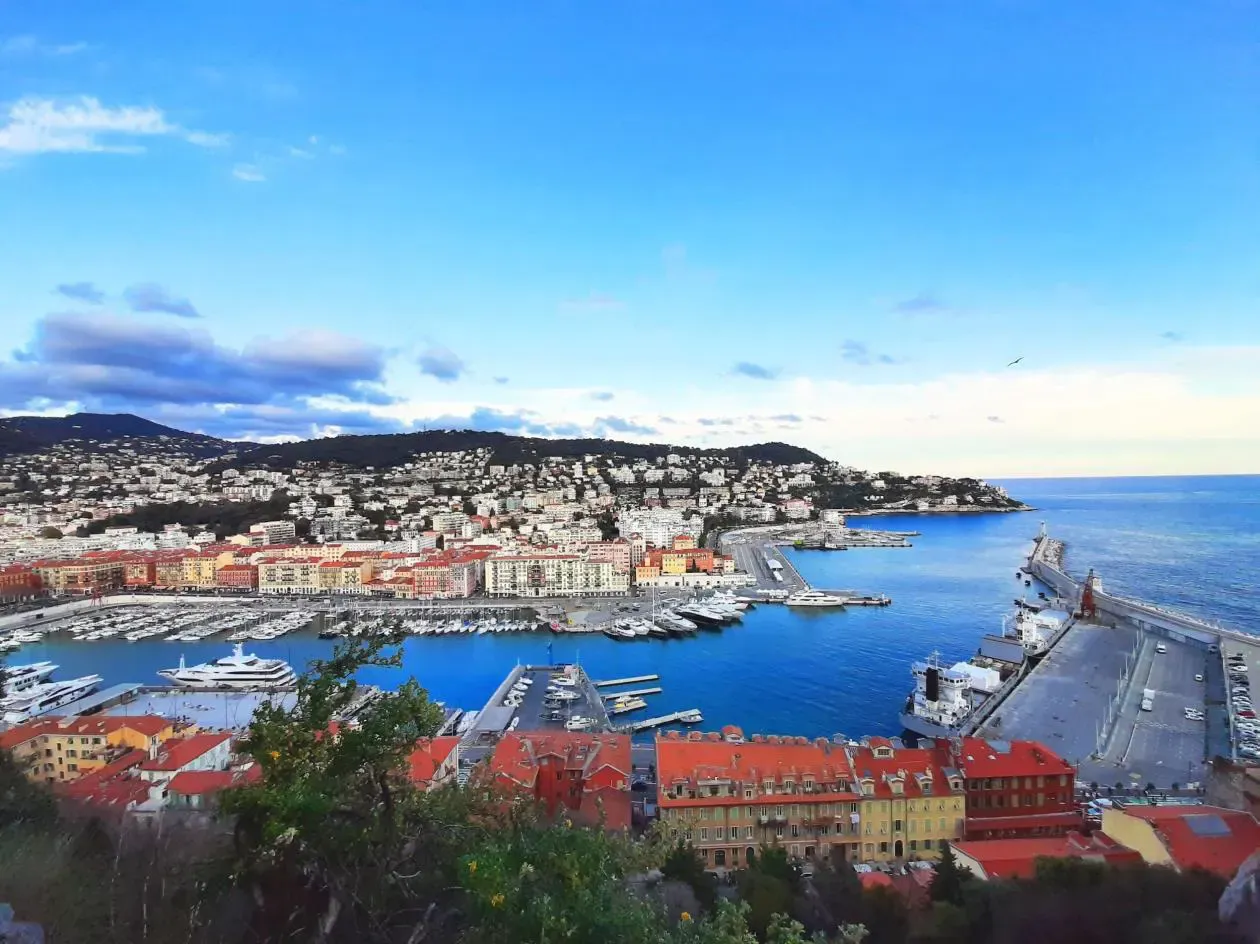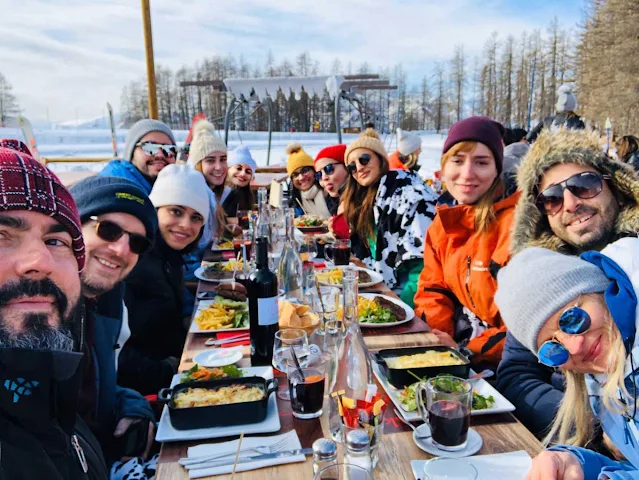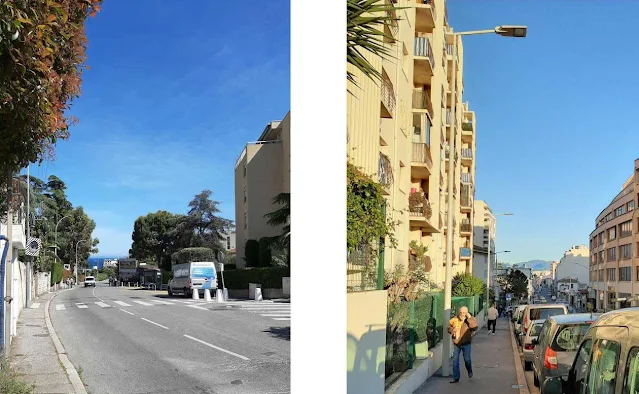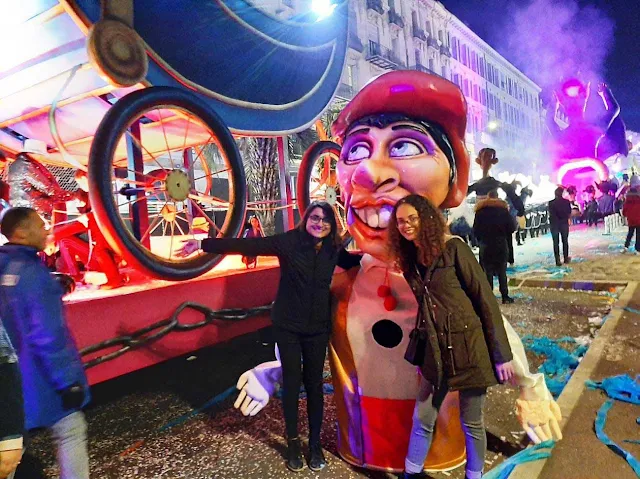 |
| The panoramic view of the port from the top of the hill |
Living in the land of baguettes,
berets, and carousels for five months as a student-intern was the ultimate
experience of my lifetime. This was my first venture outside my home country
and nothing that I could possibly imagine could get close to what I actually
experienced. In the winter of 2020, I moved to the French Riviera- in the
southern coastal city of Nice (pronounced Nees). Little did I realize that this
city, between the snowy mountains and the very blue sea, would be hands-down
the most picturesque place I have lived in.
France has many attractive student-friendly things to offer- be it free entry to museums or low-cost residency-
the country in itself is educationally accommodating as it wholeheartedly
invites brilliant minds from all parts of the world. I easily got an intern
visa (VLS-TS) for six months within one month of application. Don’t forget to
validate your VLS-TS visa within three months of your arrival in France.
- General Directorate for Foreigners in France – For validation of long-stay visas and student resident permits equivalent to long-stay visas.
When I first arrived in Nice, the
people (on the flight, the airport, and the tram stations) didn’t seem to pay
heed to a confused-looking foreigner struggling with large luggage bags. I also
happened to lose my wallet within 15 minutes of my arrival in the city, thanks to
the crowded tram and my irresponsible distraction as I took in the overwhelming
surroundings. Nevertheless, I reached a nearby Police Nationale, narrated
the details of the incident, and left for home. Even though they couldn't
retrieve my wallet until today, I was fairly impressed by their prompt response
to my situation.
Pro tip-
if you’re visiting for the very first time, keep some loose cents handy
as most ticket kiosks accept only coins and cards, and getting change might
turn out to be a hassle.
When In France, Speak as the French Speak
Frankly speaking, I had no idea
that English isn’t as widely spoken all over the world as much as I had
imagined. And, not everywhere in France has English spoken as abundantly as in
Paris. Some blame it on the French ego, but it is mostly a consequence of
passionate culture. I had conveniently decided to learn French during my
stay in Nice, but it would surely help if one had learned the fundamentals.
Nonetheless, I took it in my stride and started learning by using the online
application Duolingo from Google PlayStore. Until then, Google Translate
(offline) was my confidante.
In a few days, I understood that French, as opposed to English, is spoken more from the lungs, and once you get the accent right, or the basic grammar in place, befriending a local shopkeeper would be easy and helpful. Even when the considerate locals try to say something in English, their accent overpowers their words so much that a sentence like ‘Be careful of the Coronavirus’ sounds like ‘Be cahfool of zey Co-hona vi-hoos’. It’s tough to understand at first but feels nice when one tries (that’s what they probably think too).
- Duolingo – The best way to learn a language (free)
- Babbel – An alternative to Duolingo (paid after a few months)
From Berets to Nissa Caps
Expatriates in France usually come
from the French Overseas or Africa. In Nice, I realized that most people were
from just across the Mediterranean Sea, i.e. the African country Tunisia. I
always ran into Tunisians at the beach, the train stations, and even at billing
counters.
Whenever I, a rookie in their language, entered a store or bank, the staff and fellow customers were extremely cooperative and helped me to the best of their abilities. When visiting Le Chateau, I even made a friend Jean-a-Marie who caught me sunbathing and pondering at the viewpoint. He and I descended the hill together, with him explaining French history and introducing me to the legendary Niçoise socca- a traditional flatbread made of chickpeas.
 |
| Jean-a-Marie adorably posing for a picture |
The people at my architecture firm
were undoubtedly the best part of my entire stay. The work culture in my office
of twelve employees was very wholesome. We had people from Tunisia,
Senegal, Switzerland, Poland, and
Russia working together. They were extremely warm and endearing and helped me
from A to Z, not only because I was a complete newbie but also because I was
the youngest. Lunchtime at the office was one worth looking forward to (not
just for the food). For two hours every day, we would all collect at the lunch
table, describe what we’ve cooked, pass around our food and just talk. They
would introduce me to traditional Provençal foods like Pissaladière (pizza
with onions and anchovies) and the Pan Bagnat (burger with Niçoise salad
filling). It was a healthy way of interaction as well as cooling off before a
fresh start in the second half.
Mind you, not all workplaces are
as welcoming as mine was. A few of my friends interning at notable firms in
Paris could not establish a connection with their people because their colleagues
were not that open to un etranger (a stranger/ foreigner). Fortunately,
my colleagues and I were as welcoming as family.
 |
| A trip to Valberg with the office colleagues- Agence Griesmar Architectes, Nice |
Another noteworthy fact is that
the French always hold doors for you- be it an office building or a supermarche
or an elevator, they put their most polite foot forward. Always.
Sometimes, I felt like they got a
bit offended when I refused to take their help. I’d suggest that since they
love helping out, letting them help and following it with a ‘Merci beaucoup’
would instantly give you brownie points.
Elements of Nissa La Bella
A striking feature of the French Riviera is that it is the yin and yang of geography- you can not only spot the peaceful sea at the end of a road but also gawk at the snow-capped Alps between two buildings. The Promenade des Anglais running along the Mediterranean Sea is a prominent hub for joggers, cyclists, and leisure groups alike. The sea water is bluer than blue, and the seagulls and pigeons never leave you alone. Since I lived through the peak of winter and the onset of summer, I can safely say that the maritime weather is fairly pleasant- the chilly winters are perfect for skiing, and the summer sun is perfect to bask in.
 |
| A view of the Mediterranean Sea is visible at the end of a road and the Alpine Mountains at the end of another road |
Most of France has ancient, preserved,
bright-colored buildings. In the center of Nice, i.e. the Old City, most
buildings have bright orange, gabled, and tiled roofs with skylights and dormer
windows. Stucco-painted walls and louvered windows are a highlight feature of
all French buildings, old or new. Most residential ones have a typical façade-
balconies with awnings lined with wavy fasciae in bright primary colors, with
alternating white stripes.
.webp) |
| Striped awnings, curvy fascia and louvred windows make a typical French façade (Photo by Bookings.com) |
The Necessity Trifecta
Getting a French phone number is
probably the first thing one does when entering the country. Avoid getting one
from the airport; instead, walk out to the nearest Tabac shop. For mobile
sim cards, look for a FreeMobile store and get a truckload of mobile data for
just €10. If FreeMobile is unavailable, SFR, Lycamobile, and Bouygues are good
to go. You can avoid getting a data plan because there is FreeWifi available
throughout the country- you might want to borrow its User ID and Password from
your landlord/ friend. Most airports, train stations, trams, cafes, etc. offer
Wi-Fi too.
Another French custom you cannot
dodge is mobile applications. They have applications for everything- the bank,
CAF, strikes, local transport, etc., - all in French. In the initial days, all
I did was oscillate between these and the translation apps until I got used to
the terms.
- FreeMobile, SFR, Lycamobile, and Bouygues (in this order) – Mobile sim cards with the best call and data plans
- FreeWifi – Free Wi-Fi is available in most French cities
Food tips:
If you are a student-intern, the firm you work with will ideally provide you with restaurant tickets worth €7 - €8,5 every day. You may use these to buy lunch, or, if you wish to save money, buy groceries and cook your own lunch. These tickets are valid at most eateries and some costlier supermarkets like Carrefour and Monoprix. I wasn’t provided with a ‘Ticket Restaurant’ so Lidl, LeaderPrice, and U et Express were my go-to grocery stores. Do keep an eye out for expired goods in cheaper stores though. Also, always keep your International Student Identity Card (ISIC) handy for discounts at KFC, Subway, and McDonalds.
- International Student Identity Card (ISIC) – For regular discounts at some eateries, clothing stores, and travel tickets
Local Transport:
 |
| The Gare de Nice Ville train station with one-meter precaution marks made after the Covid-19 lockdown |
There’s also the recent
introduction of Vélobleu (Blue bike) in the city which allows users to
collect a bicycle from one of the Vélobleu stations and dock it at
another one. It is a cheap and healthy option to take a bicycle tour around the
city, especially as almost every place has particular cycling tracks and parking
bollards.
There are large pedestrian areas like
public squares and parks, especially in the city center. You can only go so far
with your car or scooter around public squares and flea markets. The vehicular
traffic is impeccably managed and rules are strictly followed- I could walk
down a zebra-crossing with eyes shut even at 02h00. There’s negligible honking
and no car waits for more than five minutes at a red light. The sheer absence of pollution makes the skies bluer and prettier than ordinary; believe me when I say that no one could appreciate pollution-free surroundings more than an Indian.
Another useful piece of advice I got was that one has got to learn to live with strikes; C’est la Gréve (It’s the strike) is a website that updates upcoming strikes and resulting transport disruptions in advance. These strikes are extremely frequent, and annoying especially if you are dependent on local transport for your daily commute.
- Ligne d’Azur and SNCF – For keeping track of buses, trains, trams, and metros
- OUIGO and TGV INOUI – For very cheap intra-city and intercity train tickets
- FlixBus and BlaBlaBus – For very cheap (but long) intra-city and intercity bus tickets
- Ryanair – For very cheap flight tickets to limited cities
- BlaBlaCar
– For efficient carpooling from anywhere to everywhere
- C’est la Gréve – For updates regarding upcoming strikes and transport disruptions
- Riviera Radio – For news and other information about Southern French cities in English!
Decent accommodation:
Fair warning- the accommodation
prices are exorbitant in Nice. Finding the accommodation of your choice at a
reasonable price and close to the place of work can be daunting, especially on
short notice. As a student-intern, be prepared to pay anything between €375 to
€550 for an individual studio apartment or room (in an apartment) of about
fifteen square meters unless you get accommodated in a CROUS residence. If not
CROUS, the most viable option is living in a co-location. Etuloge, Lokaviz,
PAP, and even Facebook (in that order) are reliable websites to find the
right accommodation.
CROUS is
a government organization providing very low-cost housing to students, both
European and overseas. It is tough to get a CROUS house as it is preferentially
provided to French students but if requested with a margin of a maximum of three
months, the request is granted. It is definitely worth the hard work as you
have to pay a mere €210 to €250 for a room of nine to ten square meters and
shared services. For my room of eleven square meters, I received €149 CAF and
paid a whopping €450 rent for a room in an apartment.
The Caisse des Allocations
Familiales (CAF) is another government organization that provides
housing aid to all individuals and families. It provides tremendous financial
support to the needy and considerably reduces the rent load, provided you are
willing to scrape through the tedious chore that is the French bureaucracy.
During the global pandemic Covid-19, many
internship terms were interrupted and people were left unemployed;
impressively, CAF provided aid of €200 to needy students and youngsters aged
below 25 years. The accommodating French Government also opened up dormitories
for the homeless, suspended rent for businesses, extended foreign VISAs, and
increased the value of the Ticket Restaurant.
- CROUS, Etuloge, Lokaviz, PAP – Reliable websites to find decent student accommodation
- CROUS services – For all student-related services like scholarships, jobs, campus life, etc.
- Visale –
For an online free and reliable guarantor (in case your landlord demands it)
- Caisse des Allocations Familiales (CAF) – For simulating and tracking your financial aid
- Foreign Students’ Guide
to French Bureaucracy – For ALL kinds of queries and confusion regarding CAF, visas, and
overall, the French Bureaucracy
.webp) |
| My room on 83 Avenue Saint Augustin (Photo by Etuloge.fr) |
Money Matters
A noteworthy feature of the
European numbering system is that the two characters, point [.] and the comma
[,] swap functions. So, €400,50 signifies four hundred euros and fifty cents,
and €40.50 signifies four thousand and fifty euros. So, next time you find
something dirt cheap in Europe, double-check the price punctuation!
The standard minimum pay for any
work in France is €3,75 per hour. My internship ran for seven hours a day in a
five-day week and I was paid a gratification of around €568 per month which is just
sufficient for survival.
The most suitable and
customer-friendly bank is BNP Paribas as it deducts the least monthly maintenance
fee (and no fee for students). If you prefer to go for online banks, Boursorama
is the one to choose as it sometimes offers an invitational reward of €80!
- BNP Paribas – The most suitable and customer-friendly global bank
- Boursorama – An online bank with occasional rewards
 |
| A weekend flea market in Cannes selling paintings, handicrafts and other souvenirs |
Living as an intern is fun because
you earn, spend and learn all at the same time. And, if you wish to make a
little extra money for a fun weekend, you can take up an hourly inventory job
at a local supermarket and receive €10 per hour for scanning barcodes (which is
a lot of money, compared to my stipend).
You can shop at the cheapest store in all of France- Primark. You can also safely add H&M, Pull&Bear, and Bershka to your shopping spree. Look out for flea markets on weekends too- they are very valuable and unique, and it is the perfect place for you if you can bargain. You can also go skiing in the mountains by bus or by car. It can be a cool getaway on a Sunday in the snow during the Winter season. And needless to say, the beach is omnipresent for you to relax and lay down in peace during the summer.
- ShowroomPrive – For online shopping of the latest brands of clothes, shoes, accessories, etc.
- Leboncoin
– For best deals online on clothes, second-hand items like
scooters, etc.
- Leclerc –
Another online (as well as offline) store for all-round shopping and delivery
Mandatory To-do List
If you have a choice, I’d say that
you could choose to live here during and after the Spring Season (i.e. April)
because Daylight Saving Time helps working individuals a great deal. Even
after returning from work by 18h00, you can let your hair down, go out and
return at 22h00 in broad daylight.
Landmark buildings:
During your stay in the Alpes
Maritimes, do not miss visiting a cathedral, as they are primeval, magnifique, and literally personify peace. You can find chapels and cathedrals at
almost every location in the city, and if you do not, simply follow the
resounding church gong! I visited The Russian Orthodox Cathedral, a famous
spectacle that feels grand inside out. The nuns here are particularly sweet-
the curator-nun gifted me a postcard with ‘God Bless You, Vidushi’ handwritten
on it.
Another must-see place is Lu Casteau (The Castle) at the top of the hill beside the port. The sheer beauty of its cascade and the overwhelming view from its Panorama Point is breathtakingly gorgeous and can never be articulated in photographs and reviews. Mind you, the name is deceptive as there exists nothing but a dilapidated castle’s ruins on top of the hill.
 |
| The cascade on a bright sunny day forms a splendid rainbow |
Events:
The annual Carnaval de Nice was
an utter delight and if you happen to be in Nice, or in France, for that
matter, during February, do not think twice before attending it. It is a grand
event consisting of themed parades like the traditional flower show during the
day and the colorful light show during the night. It is a landmark festival
and the French celebrate it with great pomp and laughter. All the music and
dance give so much of a celebratory aura, it is like the personification of a
bottle of champagne. During the Carnival, the parade-men take a loop through
the city center, sprinkling confetti of happiness on people standing on
sidewalks.
- Carnaval de Nice – A grand parade celebration of France
- Internations – A marvelous online platform for expatriates to get guidance on living abroad, attend events, and meet like-minded people
 |
| My friend, Megane Tolbise, and I at the musical light-and-sound parade at Carnaval de Nice, 2020 |
Internations is a great online
platform for expatriates to get tips and guidance on living abroad. It has a
global community of people living as expats who network, meet, and attend events
together. You can join certain activity groups according to your interests and
be part of exciting events being held in and around your city. This is one
platform I would definitely recommend to anyone who is open to the idea of new
people and places.
Au revoir, bon ami
Since I had to leave Nice suddenly on a repatriation flight to India, I wouldn’t say that my stay was crammed with experiences. Nevertheless, I couldn’t have asked for a better place to live in and better people to work with. In five months, I transformed from a newbie to a person who can type a basic work email in French. What can I say? Enchanté, jolie Nissa la Bella! A bientôt [chef’s kiss].
About the Author:
 |
| Vidushi Gupta |
Vidushi Gupta is currently a final-year student of architecture in India and will graduate in 2021. She loves writing, cooking, and playing sports- an unusual set of things that make her happy. She likes selective reading - mostly thrillers by Dan Brown and Agatha Christie and Robert Ludlum. As a person, she is a hard-working optimist with very high aspirations in life.
Vidushi came to France for her 6-month internship, considering this a once-in-a-lifetime opportunity abroad. It was the craziest experience for her, as it was her first time stepping outside India, that too during the worldwide pandemic. Living and traveling solo, she met some beautiful people and made lifelong friends in France.